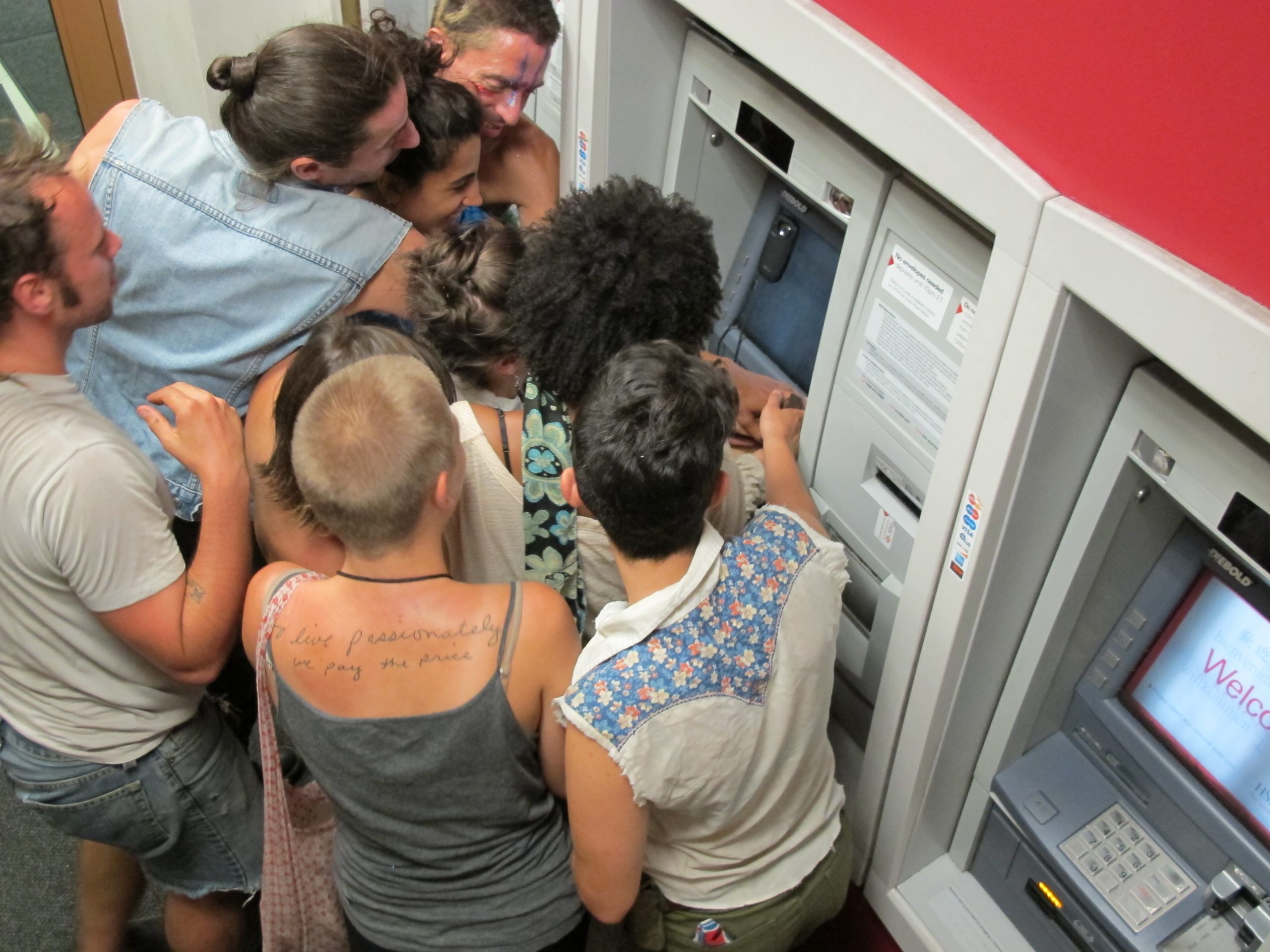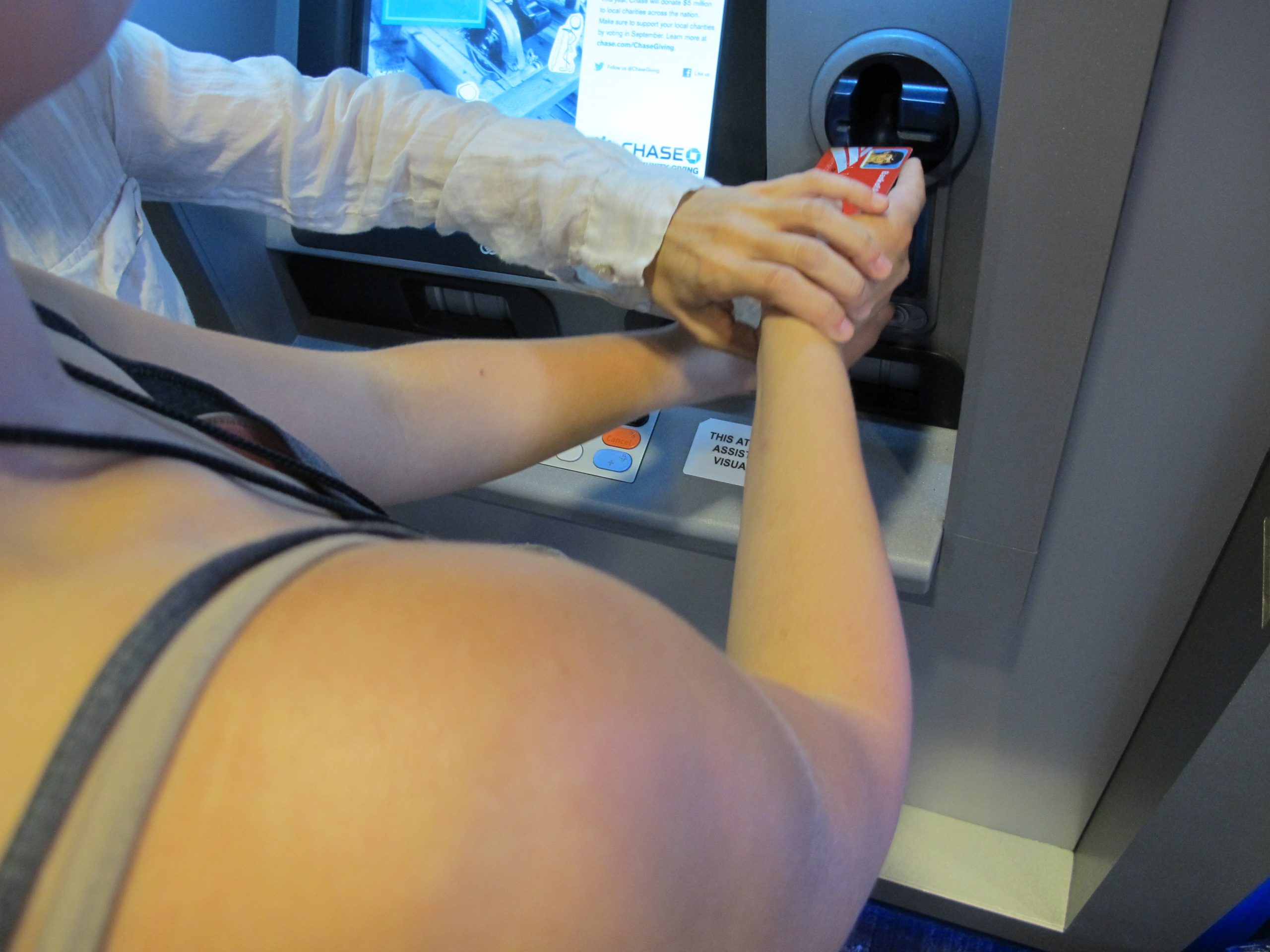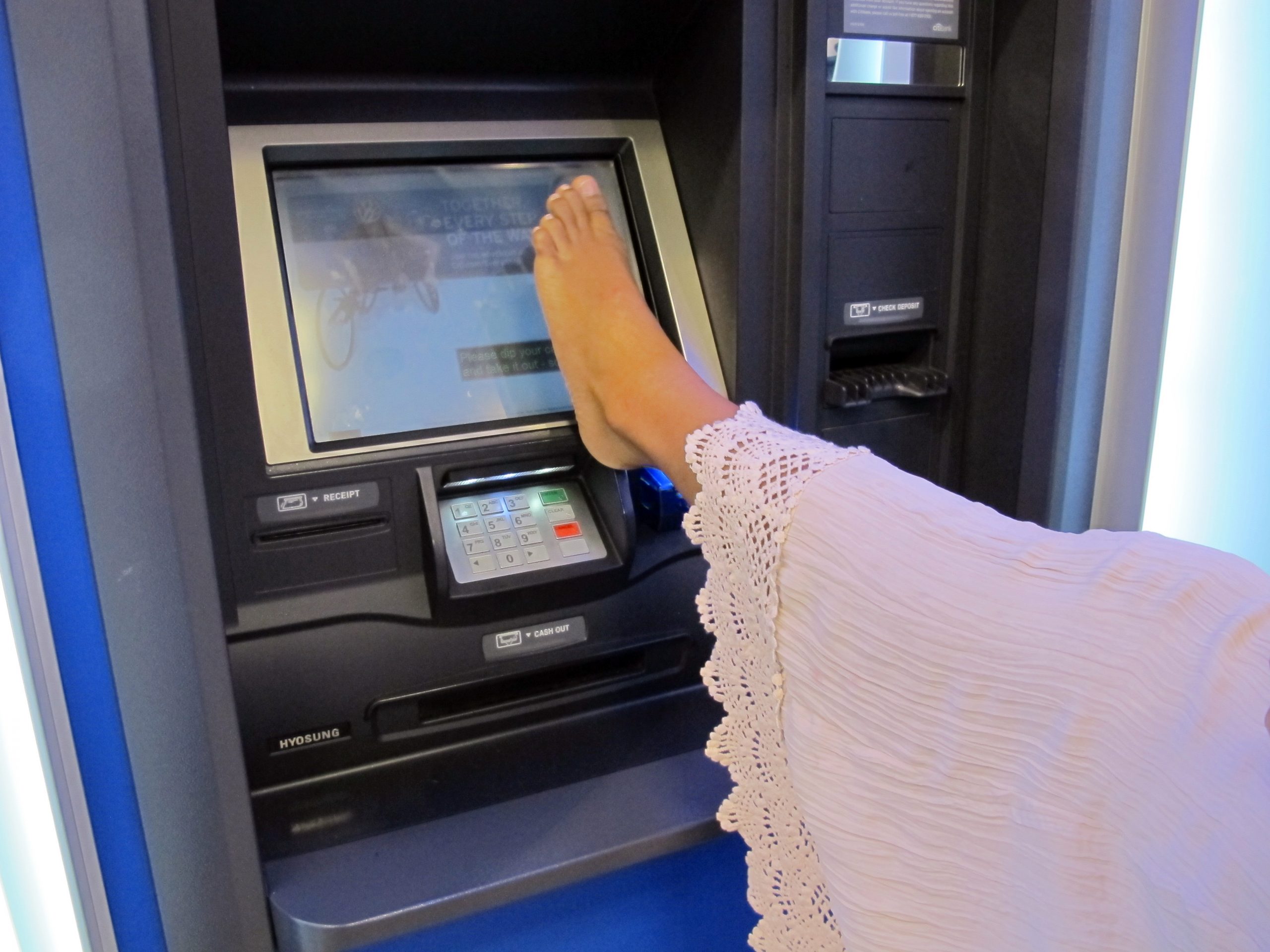What have you never done in a bank? Probably most things. 20 dancers visited 20 banks. It was 2012 and we wanted to learn how to do direct action. We washed out hands outside of the banks, using a bucket with water and soap. Then we entered and we touched everything. Everything! We tried to get as much dirt on our hands as possible. When a bank worker approached us to ask what we were doing as we were sticking our hand in the crack of the sofa or under the electrical outlet, we just said we were waiting for an appointment so we could start a collective savings account. For all 20 of us.
The following text was originally commissioned for the Journal of Aesthetics and Protest
Get in line. Alone. Face forward. Don’t speak. Never look curious. Stand up straight. Don’t look like you are seeing someone else. Don’t touch anything. Be as clean as possible. No abrupt movements. Give space to the people around you. Never touch anyone. Act like you are calm. Don’t deliberate. Be natural, efficient. Don’t act suspicious. Be hard. Never go limp. If you mess up, you have to do it again but more. Always apologize.
Who maintains these rules? Security guards? In Manhattan, there are rumored (by the NY Department of Labor) to be approximately 50,000 licensed guards. Most of them are making minimum wage in a highly fraudulent industry—a force of people being images of authority.
Who maintains these rules? The customer service agent at the bank? In Manhattan, there are rumored (by the NY Department of Labor) to be approximately 50,000 commercial bank workers. Most of them are making minimum wage in a highly fraudulent industry—a force of people being images of financial rationality.
Who maintains these rules? I do. I don’t have a lot of money in the bank and I don’t like to think about it. Thinking about it is a distraction that keeps me from the path that I am on. Not thinking about it means that I have paid unnecessary fees to corporate banks for years.
Who maintains these rules? We were a group of approximately fifteen dancers. We did. Until, slowly, we did not. In 2012, I was asked by the Flux Factory in Queens, NY to respond to the question: what do institutions DO? In the process I realized that there is a difference between what an institution does, what we assume that its actions demand of us, and how the way that an institution works can impact the way we feel about ourselves. When we are afraid, when we feel tricked, when we are trying to protect ourselves against risks that we don’t understand, it is very hard to behave outside of what is modeled. Flux Factory supported us to go to twenty NYC banks and touch everything. We began a project that I called ‘Physical Audit.’ In the banks we searched for dirt with our hands. The dirt we sought was a sign of life—particles that once participated in protecting a person, being their skin, all over the white walls of the banks. If we found an organic trace of life inside of financial institutions, perhaps the sharp sheen of the bank would become dull, and its stoic power over us would dissipate.
We washed our hands in a ritual in front of every bank we entered. A bucket, soap, and warm water on the street. We made contact with banks.
First we practiced. We met in a series of ATM vestibules along 14th street in Manhattan, where we tested what we “could” do in these spaces. When I imagined what would act as limitations, I imagined the security camera, guards, employees, and police enforcing our participation in the rules. I was violently afraid.
The first exercise was inside of a Chase Bank foyer at 7pm. There was a man cleaning the room when we arrived. We were afraid of him. He was cleaning the dust from the top of the glowing Chase sign, using a mop. To us, he represented the bank, and so we were afraid of him. We had to reassure ourselves—he is a worker, a man, and he is not the bank. In partners, dancers led each other around the space while one partner closed their eyes. The blinded person was manipulated by the other one, and their soft body was used to take money out of the ATM, and to touch the dirt in the bank. We were doing everything wrong. We were jamming our fingers in places that had never been touched and we were touching buttons with two fingers at once: fingers from two different people on one ATM button. We filled the space for twenty minutes. For twenty minutes, the rules dissipated, and customers attempting an ATM transaction continued on as usual, mostly pretending not to notice. The man who was cleaning stayed for the duration.

The bank was very dirty. It’s amazing how clean it appeared to be, when the bottom of the table where you fill out deposit slips had likely never been cleaned, the same of the bottom of the pen holding compartment, the tops of the door hinges were filthy, the crevices between the buttons were filled with grit, and the recessed part of the windowsill was a cesspool of discarded cells. The chase logo was so bright and the windows so reflective that we couldn’t see these details until we touched them.
We did this over and over again for a week, practicing in vestibules. No one ever came to stop us. Sometimes fifteen people used one ATM at the same time—a “collective transaction.” Sometimes we all played with one puppy in the center of the bank for extended periods. But no matter what, we always stopped what we were doing after a few minutes. A silent alarm went off inside of us and we knew that we needed to go. Until the very end of the project we never pushed far enough to feel something push back. Going into these scenarios, I think we all assumed that we would be disciplined. However, we were the ones doing the disciplining.
When I was in graduate school the previous year, I had been creating a lot of debt, some of it resulted in visible byproduct, which we called art. I was working tirelessly at understanding what was real (art? debt?). At one point, through a series of attempts to become the artist in residence in the Financial Aid office, I had been asked by the head of my department to stay out of these administrative areas of the school.
In drawing class one day, I asked my classmates to wash their hands, enter the foyer of the Financial Aid office and to touch everything in search of dirt. Once dirty, they could make a rubbing with their hands.
During my meetings inside of the Financial Aid office, I began to imagine what could happen if the messy humanity of art school was allowed into the overpopulated and orderly administrative and financial sectors of the school. At this moment, watching all my classmates in the office touching the top of the door, the bottom of the brochure holder and the top ridge of the socket, I realized I had never seen anything like it before. It was so strange to see fluid physicality in that space. And the rubbing revealed that the place was filthy. It made me think about how much we discard of ourselves when we enter into financial behavior. And if we could apply the same ingenuity we have in our art practices to this aspect of our lives, would we allow corruption, debt, and financial disparity to happen on such a large scale? As a good friend once said in a lecture, “I want to be alive.” I would add, “everywhere.” Or else.
So after a few practice runs in ATM vestibules in NY, we began to meet in smaller groups of 2-7 people, in front of banks during business hours. We washed our hands and entered. We asked to open a collective savings account. The greeter led us to sit on the couches and wait for a banker to meet with us. The foyer of the bank became our stage. However, it was very hard to ignore the instructions to “please have a seat.” During the first few bank visits like this, I found myself taking the banks instructions and sitting down to wait and only mildly participating in the touching. Some of the more practiced dancers were able to risk larger movements, while others like me were visibly frozen, unable to break out of being a good customer. I watched one dancer lie on the floor as he caressed the bottom of the podium where the greeter stood. I looked at another dancer with a slight cringe. How difficult it is to stand up against my own regulations.

As the project progressed, we became looser. The banks became places of play for us. We pushed up against our own sense of right and wrong in these spaces that exude control, but who do not articulate it. I lay across three chairs, fitting my body between the arm rests and the seat. The banker comes out to invite us to her office. In the office Edie puts her bare feet on the table and spills her purse on the floor. We both get on the floor and rub it, violently with our hands. We sit back up and the banker asks us: “So now, you’d like to open a Collective Savings Account? Can you explain to me exactly what that is?”
We explain again and again—it is an account where many people make deposits and withdrawals in the same account. We want to share a balance. We are part of a huge collective of people trying to collect money to support a project.
What kind of project?
It’s a series of dance performances.
Oh, where do you perform?
Everywhere.
When are the performances?
Right now.
The more we did this project the more I felt that it was for the dancers, the bankers, and the customers. It was not to use the bank as a stage, or to prove a point, but to open possibilities. With an awareness that the bank is made of soft vulnerable people (dancers, workers, customers), the work was to reveal openly to as many people as possible that there still is something that dominates money, and that is the dirt that can never be cleaned. Dirt is made of cells, and those cells are from people.
Feeling the banks with our hands is one way to not go limp in the financial landscape. To all people who were robbed and who are afraid: no structure should be treated with obedience no matter how concrete the monolith appears. The traces of aliveness we found in the dirt of the banks does not render the actions of financial institutions natural or forgiven. We will not forget the systematic robbery of the poor and working class, and all the fear that we carry as a result. Our new responsibility is to avoid fear that we learned from the culture of finance, because it is a crappy way to live. We can start by reorganizing our own internalized sense of right and wrong behavior, making room for ourselves to expand into every role except that of the compliant customer.

 means I chose not to be paid;
means I chose not to be paid;  means I got paid a relatively small amount of money, but it was what the venue/situation could afford and I did it for different reasons than money;
means I got paid a relatively small amount of money, but it was what the venue/situation could afford and I did it for different reasons than money; 